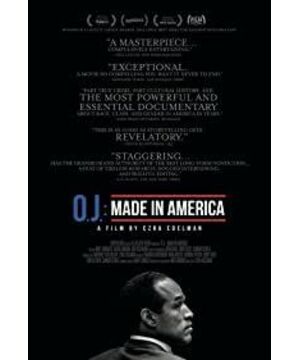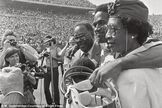1. Skin color struggle
In the "Glory Years" dedicated to Mandela by the Beyong band, they called Mandela's great cause of anti-apartheid "skin color struggle"-the vigorous anti-apartheid struggle since the mid-twentieth century is indeed It is the "struggle" caused by the "skin color".
This "skin color fight" has been going on in the United States for more than half a century, and it has not yet ended. To this day, "anti-apartheid" has become a basic social consensus in the United States, but the "plot" of the "struggle" still reverses from time to time.
After watching this 7-and-a-half-hour documentary "The Simpsons: Made in America", I deeply feel that the "skin color struggle" is not simply a question of "justice". It also triggers a series of social problems, which reflect The tragedy of the individual.
2. Made in the U.S.
Speaking of the character of OJ Simpson, his unparalleled football career and the "Simpson Wife Murder Case" are the two most important tags on his body.
The "Simpson Wife Murder Case" triggered a "Trial of the Century", and the entire incident had a profound impact on the judicial process in the United States.
Nowadays, many people say that Simpson will "kill his wife" and are no longer interested in his brilliant football career. In fact, Simpson's rugby career is inseparable from the "wife murder case".
Rugby career is the cornerstone for Simpson to become a social elite and enter the upper class. In an era when black-and-white marriages were still relatively rare, the combination of Simpson and Nicole Brown can be universally recognized. It is related to his football star status and his self-consciousness that deliberately blurs the boundaries of skin color—and the formation of this self-consciousness , And closely related to the glory brought to him by his rugby career.
Before becoming a "wife murder suspect", Simpson was far away from the "skin color struggle", and his circle of life was "bleached". But without a brilliant rugby career, even if he wants to "bleach", I am afraid it will be difficult to be accepted. Of course, the affinity of "Mr. Juice" (Simpson's "nickname") is also an important reason for his widespread acceptance.
Taking the "wives murder case" as the dividing line, Simpson stayed away from his "skin color" in the first half of his life, and Simpson moved closer to his "skin color" in the second half of his life. Never been an "outsider".
3. 360-degree growth history
As a documentary about Simpsons, "Simpsons: Made in America" inevitably puts the "Simpson Wife Murder" as the focus of the film, but the documentary's excellence lies in its presentation of content outside the case.
The first and second episodes of the film are about the growth history of Simpson before the "Wife Murder Case". This part is 180 minutes long, which is a full 40% of the movie!
In this part, the film does not simply tell Simpson's personal history, but allows him to "interact" with the social environment at the time. Simpson is the great Simpson, the Simpson loved by thousands, the Simpson in American society, and the Simpson in the "skin color struggle".
Many of the black stars in the 1960s devoted themselves to the "skin color struggle" led by Martin Luther King. The black community also hoped that Simpson would join, but Simpson repeatedly emphasized that "skin color is not his most important feature." He never spoke for his ethnic group from beginning to end.
Looking at Simpson's "idea" of deliberately blurring his skin color after the racial integration, he is also politically correct. But from the perspective of the social environment at the time, Simpson's "idea" was more of a selfish choice.
Although everyone loves "Mr. Juice", under the glamorous appearance, Simpson's "inferiority" has never been rooted out.
According to his upper-class friends, Simpson liked to play tricks of cheating in golf games, which is a very despised behavior in upper-class society. This small detail exposes Simpson's deep-rooted bad habits.
Simpson, who was born at the bottom, was inevitably self-inflated after he became famous. He is very masculine and has a strong desire for control. He often messes with flowers and grass outside, but he has to firmly control his wife's every move.
And Nicole Brown is not a compliant character. The powerful Simpson is naturally easy to fall into the vortex of solving problems with his fists. From domestic violence to marriage breakdown, this is the way to go.
The extraordinary athletic ability allowed Simpson to solve the wealth problem, and also allowed him to cross the gap between class and race, but the influence of his growth background, personal character and native family also allowed him to harvest all this without establishing a new life. balance.
In the end, he stepped into a personal tragedy and pushed the three families into the abyss of tragedy.
4. Suspicious interests belong to the defendant
"Simpsons: Made in America" is a documentary that "presents facts and speaks logic", but the film still has the "personal standpoint" of the creator.
The most obvious "personal position" in the film is-implying that Simpson is the murderer.
In fact, this "personal position" also represents the position of most Americans-although Simpson was acquitted, it is difficult for most Americans to believe that he is not the murderer.
The film reproduces the nine-month-long "Judgment of the Century" through a large number of court trial videos and interviews with related characters in about 3 hours.
From the evidence, from the motivation, and from the behavioral inference, Simpson is highly suspected, but the conviction of the murder case requires "iron evidence", and the flawed evidence just shakes the foundation of the "iron evidence".
Although most people use simple logic to "convict" Simpson, simple logic cannot be applied to the "conviction" in criminal courts-it must be supported by a complete chain of evidence.
Although the "not guilty verdict" caused an uproar that year, according to the principle of "the interests of doubtful points belong to the defendant", the jury made such a verdict and did not violate the duties of the jury.
Judging from the performance of the prosecution and defense in the court trial, letting Simpson try on the gloves was a "faint move" of the prosecution, while the defense played a "racist" card to divert the jury's attention, which interfered with the jury to some extent. Judgment of —— Although this move "wrong", it hit the key point, it was a victory in defense technology.
Many years later, when interviewing the defense lawyer of that year, the other party repeatedly avoided questioning the so-called "truth". What he emphasized was his professional behavior as a lawyer-to provide clients with a defense that was beneficial to him to the maximum.
Therefore, if Simpson is not a rich person and cannot afford to hire such a powerful team of lawyers, the outcome of the case is likely to be the opposite.
5. Two other retaliatory trials
Simpson was acquitted and relied on the "racism" card to some extent, and this card was actually a double-edged sword that could free Simpson from crime and avenge him severely.
In the United States, criminal judgments and civil judgments are separate, and their judgment standards are also quite different. Civil judgments can be made based on common sense based on on-site evidence, and there is no need for "iron proof." The large amount of civil compensation in the Simpson case made the Brown family and the Goldman family become Simpson's largest creditors and life-long creditors.
In September 2007, Simpson was arrested for a so-called armed robbery.
Although there are various "facts", this robbery is actually an "Oolong case"-Simpson was urged to take back his so-called "souvenir". But Simpson paid a price far more than his reckless behavior for this, and was sentenced to 33 years in prison!
The three verdicts that happened to Simpson were "off the track" because of his skin color and celebrity status. On an enlarged scale, it is difficult for these three judgments to “racism” be separated from the relationship—social problems and individual tragedies are simultaneously presented in the “skin color struggle”.
6. Win the lawsuit and lose your life
Simpson won the lawsuit but lost his life, his family was ruined, he was no longer the beloved "Mr. Juice", and the upper class that he had tried to get close to in the first half of his life no longer accept him.
Simpson simply broke the jar, mixed up with the three teachers and the nine students, and continued to consume his celebrity status.
If OJ Simpson is a product made in the United States, then the first half of his life can be said to be the positive side of the American dream, while the second half of his life has become the negative side of the American dream.
View more about O.J.: Made in America reviews











